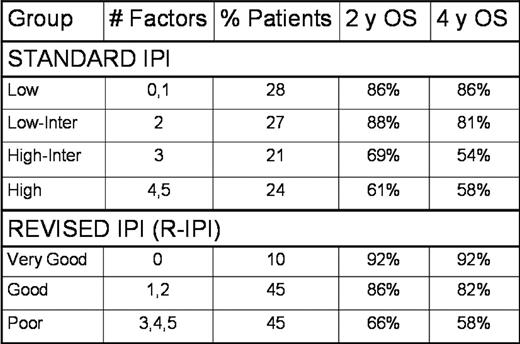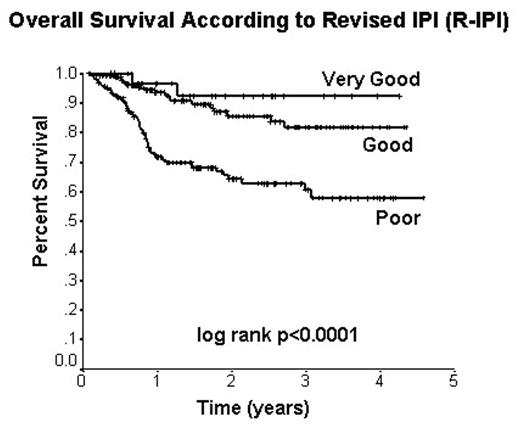Abstract
Background: The IPI, which was developed prior to the availability of rituximab, remains the primary clinical tool used to predict outcome for patients with DLBCL. Since clinical trials investigating the use of rituximab and chemotherapy in this patient population have been confined to either elderly or young patients exclusively, the utility of the IPI in the era of immuno-chemotherapy remains unknown.
Methods: We performed a retrospective analysis to assess the predictive value of the IPI in an unselected population of patients with DLBCL treated with R-CHOP. Patients were identified using the Lymphoid Cancer Research Database of the British Columbia (BC) Cancer Agency. We included all patients ≥16 years of age who were newly diagnosed with DLBCL prior to Jan 15, 2005, and were treated in BC with an R-CHOP protocol. Patients were excluded if they were HIV positive, had evidence of an active second malignancy or an underlying indolent lymphoma.
Results: 365 patients were identified. Patient characteristics were as follows: median age 61 y (16–90); male, 61%; advanced stage III/IV, 59%; elevated LDH, 54%; PS≥2, 40%; >1 extranodal site, 35%. Central pathology review was performed on 95% of patients; 324 DLBCL, 36 PMBCL, 5 other. All patients received R-CHOP; 9% were treated with R-CHOP x 3 and involved field radiation therapy for limited stage disease, remaining patients received 6–8 cycles of R-CHOP. Median follow-up for living patients is 22 months. Overall, the IPI remains predictive for both progression-free survival (p<0.0001) and overall survival (p<0.0001). However, the IPI no longer permits separation between the two low risk subgroups (low v low-intermediate) or between the two high risk subgroups (high-intermediate v high). (see Table) An alternate grouping of the IPI is proposed (R-IPI) that identifies three distinct prognostic groups. (see Table and Figure)
Conclusions: The IPI remains predictive in the era of immuno-chemotherapy, but the R-IPI provides a simplified and more accurate prediction of outcome. The IPI factors can no longer be used to identify a group with less than a 50% chance of survival.
Overall Survival According to Revised IPI (R-IPI)
Overall Survival According to Revised IPI (R-IPI)
Author notes
Corresponding author



This feature is available to Subscribers Only
Sign In or Create an Account Close Modal